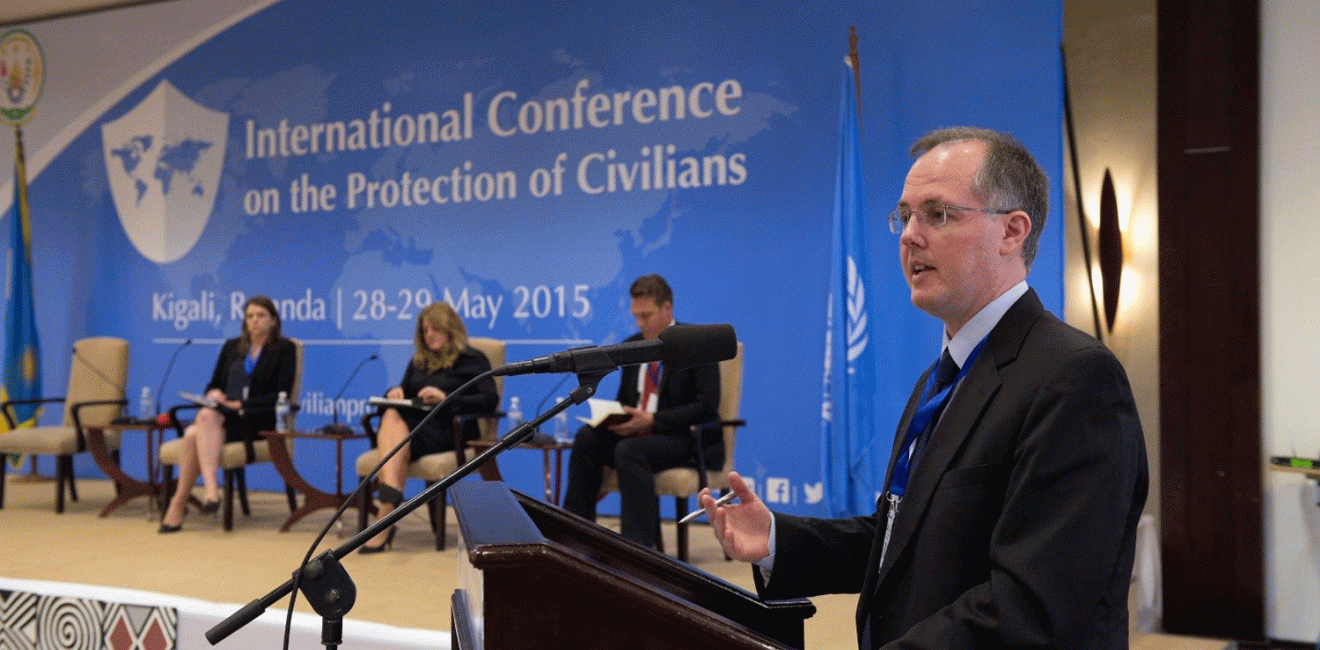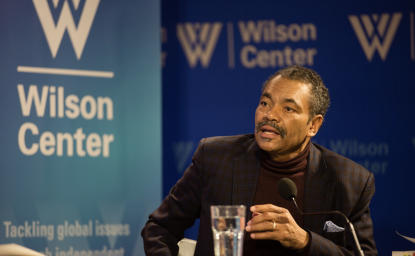
A blog of the Wilson Center

Professor Paul D. Williams was a Visiting Fellow with the Wilson Center from August 2014 to May 2015 and then a Global Fellow affiliated with the Center's Africa Program from August of 2015 to July of 2017. He is currently Associate Professor of International Affairs and Associate Director of the Security Policy Studies Program at George Washington University’s Elliott School of International Affairs. Williams previously taught at the Universities of Aberystwyth, Birmingham, and Warwick in the United Kingdom and was a Visiting Scholar at Georgetown University and the University of Queensland, Australia. He has served as a Visiting Professor at the Institute for Peace and Security Studies at Addis Ababa University in Ethiopia. Williams’ books include “War and Conflict in Africa” (Polity, 2011), “Understanding Peacekeeping” (Polity, 2nd ed., 2010), and “Providing Peacekeepers: The Politics, Challenges, and Future of UN Peacekeeping Contributions” (Oxford University Press, 2013). He is also on the editorial boards of African Affairs and Global Responsibility to Protect.
Q&A
Q: What issues or topics are you working on currently?
A: I’m currently working on three projects. First, I’m finishing the third edition of a textbook on contemporary international security issues: Security Studies: An Introduction (Routledge). Second, I’m completing the manuscript of the book I worked on during my fellowship at the Woodrow Wilson Center. Called Fighting for Peace in Somalia, this book analyzes the evolution and operational challenges of the African Union Mission in Somalia (AMISOM) since its deployment in 2007. Thirdly, I continue to study the politics of contemporary peace operations and how they might be made more effective by managing the “Providing for Peacekeeping” project in conjunction with the International Peace Institute in New York.
As a place to work, the Wilson Center was ideal. Its offered excellent facilities, its staff were consistently helpful, and its leadership ensured its fellows could really take time to read, discuss, and think about their work.
Q: Have you found your association with the Wilson Center to be beneficial to your work?
A: Very much so. I had interacted with the Africa Program for several years before I became a fellow at the Center. I found it to be a useful place to make contacts with experts beyond academia and to think about how scholarship could help inform more effective policies undertaken by governments, international organizations, and NGOs.
Q: What are your best memories of your time in residence at the center?
A: The people and the place. As a place to work, the Wilson Center was ideal. Its offered excellent facilities, its staff were consistently helpful, and its leadership ensured its fellows could really take time to read, discuss, and think about their work. It was an added bonus to meet so many interesting people who were part of the Center’s programs or fellowship recipients.
Q: Would you recommend a term as a Wilson Center fellow to a colleague?
A: Absolutely. It is an excellent base for a scholar to conduct their work.
Q: There are lots of conversations about “impact” in the think tank world. What’s the best example you can provide that highlights the impact of your work?
A: During my time as a Wilson Center fellow, I also wrote a report for the Council on Foreign Relations about how the United States government could more effectively support peace operations in Africa. In the course of conducting the research for that report, I had the privilege to engage with many of the people who were making US policies in this area at a time when really constructive change was taking place. This was exemplified by the Peacekeeping Leaders’ Summit chaired by President Obama in 2015, and the roll out of the United States’ first presidential policy on peace operations since 1994.
Owing to my ongoing research on the politics of contemporary peace operations in Africa, I was asked to participate in an African Union and United Nations joint review of support mechanisms to peace operations in Africa authorized by the United Nations Security Council. I was also able to participate in the African Union’s process for learning lessons from the ten years of its operations in Somalia. Most recently, I was able to participate in a table-top exercise for senior US government and military officials organized by the United States Institute of Peace. This analyzed the potential scenarios and issues that will shape US policies in Somalia as the African Union starts to withdraw its peacekeepers.
Q: Do you have any upcoming projects or other future plans you can tell us about?
A: Hopefully in 2018, I will be able to publish the 3rd edition of Security Studies: An Introduction (with Matt McDonald) and my single-authored book, Fighting for Peace in Somalia: A history and analysis of the African Union Mission, 2007-2017.
Author

Professor of International Affairs and, Associate Director, M.A. Security Policy Studies Program, The George Washington University
Explore More in Scholar & Alumni Spotlight
Browse Scholar & Alumni Spotlight
Olufemi Vaughan: Shaping Governance Through Scholarship and Dialogue

Dr. Maurice Jackson: The Sounds of Resistance Throughout History

